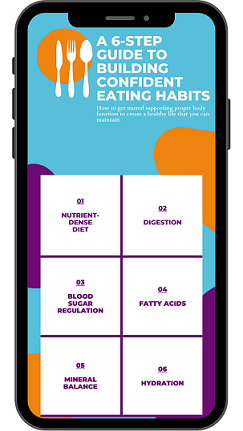Have you ever dreamed of that perfect crunchy/gooey sweetness of a chocolate chip cookie before you had even eaten your dinner?
That used to be me every night. I had a hard time actually wanting a meal because my sweet tooth was drawing me towards all the foods I knew I didn’t need to be eating. I thought it was just a problem with me. I would go through phases of trying to resist and cut out sweets. Then I’d have a bad day or feel like I deserved a treat and be right back where I started giving in to all my cravings.
It all changed one day. I learned that I didn’t have to suffer through the endless sugar cravings – the problem wasn’t just in my mind. I had a problem with my blood sugar regulation*.
Here’s the typical cycle of imbalanced blood sugar:
- You crave something sweet or caffeinated
- You satisfy the craving and your blood sugar spikes
- Thereafter you feel shaky and off which signals low blood sugar
- You crave something sweet or caffeinated again
- Now you’re stuck in the vicious cycle of blood sugar peaks and valleys
If you’re ready to get off the blood sugar roller coaster, this article will teach you five ways to stop sugar cravings in their tracks!
1) Focus on eating balanced meals throughout the day
Protein, fat, and carbohydrates are the nutrients our bodies require the most of, known as macronutrients. Eating appropriate amounts of them in each meal will fuel your body to keep your blood sugar levels in balance. Wondering what a balanced meal looks like? Start your day with a breakfast of pasture-raised eggs, sausage, and hashbrowns.
2) Avoid refined sugars and processed carbohydrates
Refined sugars and processed carbohydrates include foods like muffins, candy, chips, cereal, bread, etc. Try to enjoy these foods in moderation, as eating them throughout the day can feed into the vicious cycle of blood sugar spikes and crashes.
3) Stay properly hydrated
Research has shown that dehydration is associated with blood sugar dysregulation which leads to intense sugar cravings1. As a general rule of thumb, aim for half your body weight in fluid ounces. For example, if you weigh 140 pounds, aim for 70 fluid ounces of filtered water per day.
4) Move your body regularly
It doesn’t take a set exercise regimen to stay healthy. Just getting up and moving your body each day has been shown to improve blood sugar regulation2. Find a way to move that you enjoy, like going for a walk, taking a bike ride, doing squats during commercials, or stretching before bed.
5) Get a good night’s sleep
Research suggests that sleep loss can make it more difficult for the body to regulate blood sugar properly, which could increase the risk of the development of diabetes3. Partial sleep deprivation is also associated with changes in appetite-regulating hormones, and these changes would indicate an increase in appetite, which may lead to increased food intake and weight gain4. Aim for 7.5-8 hours of sleep per night.
Eating more balanced meals, drinking enough water, staying active, and getting a good night’s sleep are all lifestyle shifts that will help you feel balanced and healthy. When making changes, remember there is no such thing as perfect. Try your best to do what you can each day! As a Nutritional Therapy Practitioner, my job is to help you make these step-by-step changes easier for you. To learn more about what it looks like to work together, click here.
*The information in this article is not intended or implied to be a substitute for professional medical advice, diagnosis or treatment
SOURCES
- Johnson EC;Bardis CN;Jansen LT;Adams JD;Kirkland TW;Kavouras SA; “Reduced Water Intake Deteriorates Glucose Regulation in Patients with Type 2 Diabetes.” Nutrition Research (New York, N.Y.), U.S. National Library of Medicine, https://pubmed.ncbi.nlm.nih.gov/28739050/.
- Kirwan, John P, et al. “The Essential Role of Exercise in the Management of Type 2 Diabetes.” Cleveland Clinic Journal of Medicine, U.S. National Library of Medicine, July 2017,www.ncbi.nlm.nih.gov/pubmed/28708479.
- &4. Knutson, Kristen L. “Impact of Sleep and Sleep Loss on Glucose Homeostasis and Appetite Regulation.” Sleep Medicine Clinics, U.S. National Library of Medicine, June 2007, https://www.ncbi.nlm.nih.gov/pmc/articles/PMC2084401/.


